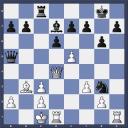Irina Krush, 23, the new U.S. Women’s Chess Champion, is making her way today from Stillwater, Oklahoma, the improbable site of the women’s championship, to Montreal, where she is playing in the seven-round 2007 MonRoi International Women’s Grand-Prix Finale. The first round is tomorrow—she doesn’t even get a day’s rest—and continues through July 28. Chess organizers generally do not consult each other about the timing of their tournaments, and so the professional chess circuit can be grueling or even maddeningly impossible. (A ridiculous example of the latter happened in May, when Gata Kamsky, the top rated American player, had to sit out the U.S. Championship, also in Stillwater, because of a prior commitment to play in a strong tournament in Europe.) OK, Krush’s hurried travel to Quebec is made easier by the flush of victory—and the fact that chessmate Pascal Charbonneau is waiting there to celebrate with her. They are both two-time champions, he of Canada and she of U.S. Women’s chess, of course.
While Irina was tearing up the chessboard in Stillwater, which is America’s newest chess mecca thanks to the generous sponsorship of Frank Berry, Pascal was playing his first two games in the 2007 Eighth Montreal Chess International, one of the strongest chess events ever held in North America. It is so strong that Pascal, rated 2503, is seeded last! He lost the first game and then winged his way through an opening he barely new (the White side of the Two Knight’s Defense) to achieve a draw against “Chucky,” the No. 1 seed Vassily Ivanchuk of Ukraine. Ivanchuk, the No. 4 player in the world, with a rating of 2762, outranked Pascal by an imposing 250 points.
Pascal told me that he was happy Irina had won. Now, he said, he could try to focus on his own remaining games in the tournament (there are seven more rounds, the last on July 28) rather than worrying about how she was doing.
Thanks to MonRoi, the games in both and 2007 MonRoi International Women’s Grand-Prix Finale.


